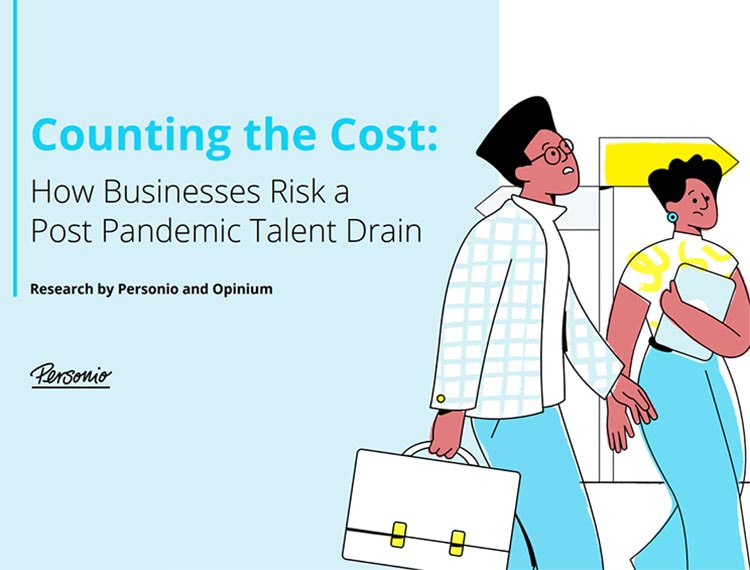Post-pandemic talent exodus could cost businesses up to £17 billion

Counting the Cost: How Businesses Risk a £17 billion Post Pandemic Talent Drain
Businesses may be sleepwalking towards a costly talent exodus, as four in 10 employees (38%) are looking to change roles in either the next six or 12 months.
Once the COVID-19 pandemic is over, 55% of 18-34-year-olds plan on leaving their current employer, according to “Counting the Cost: How Businesses Risk a Post Pandemic Talent Drain“, new research by HR software company Personio.
- The cost of additional staff turnover over the next 12 months could amount to an estimated £16.9 billion charge for businesses in the UK and Ireland.
- This would equate to £10,076 per business, with SMEs alone facing estimated costs of up to £5.8 billion.
- While nearly half (45%) of employers are worried staff will leave once the job market improves, only a quarter (26%) said talent retention is a priority for their organisation over the next 12 months.
Over the past year, many businesses have been in crisis mode. And, for some, the focus on firefighting has caused other areas, such as their people strategy, to fall to the wayside. But negligence comes at a cost.
Businesses that haven’t prioritised their people during the pandemic could be sleepwalking towards a talent exodus, damaged employer brand and a productivity drought. And the detrimental impact this will inevitably have on business performance won’t become apparent until it’s too late.
To explore the cost of poor people strategy during the pandemic, Personio surveyed 500 HR decision makers and 2,000 employees in the UK and Ireland and conducted economic analysis based on findings and other publicly available information.
Personio considered productivity losses, staff attrition and the impact of these on business performance – demonstrating the value of a strategic HR function in boosting a business’s bottom line – and, in turn, the economy.
Nicole Sahin, Founder and CEO at Globalization Partners:
“Pre-COVID, organisations were already struggling to address the emerging skills gaps associated with operating in a digital economy. As a result, firms are having to reskill their existing talent or be lucky enough to find and hire the talent they need to fill emerging skills shortages.
“However, lessons learned during the pandemic mean leaders now appreciate that their talent pool is no longer limited to within 50 miles of their offices. Having the infrastructure in place that makes it possible to remotely interview, onboard and support talent that is hundreds of miles away means that hiring talent from anywhere has become an achievable reality.
“For organisations facing talent shortages in their own country, this means they are now free to look further afield for the right person for the job. Remote working represents a major opportunity for all since it creates an integrated workforce in which location no longer defines access to career opportunities or the ability to contribute.”
Hanno Renner, co-founder and CEO of Personio, said:
“The last year has been a challenging one for businesses and HR teams who have often found themselves ‘firefighting’, dealing with multiple new tasks and concerns. For some, this has caused other areas such as people strategy to fall to the wayside – but this negligence comes at a cost.
“Falling out of touch with the workforce’s problems and priorities means that not only could people be more frustrated and ready to resign, but employers will be poorly prepared to prevent people leaving – resulting in lost talent and productivity, and damaged employer brand.”
Methodology: Survey fieldwork was undertaken on behalf of Personio by Opinium, with fieldwork conducted between 12th and 22nd March 2021. The survey sample was 500 HR decision makers and 2,002 workers in the UK and Republic of Ireland, across a range of industries and organisation types and sizes. The report also includes figures from survey fieldwork undertaken in Europe amongst comparable samples in Spain, DACH (Germany, Austria and Switzerland), and the Netherlands. Economic analysis was conducted by Development Economics on behalf of Personio.












Responses